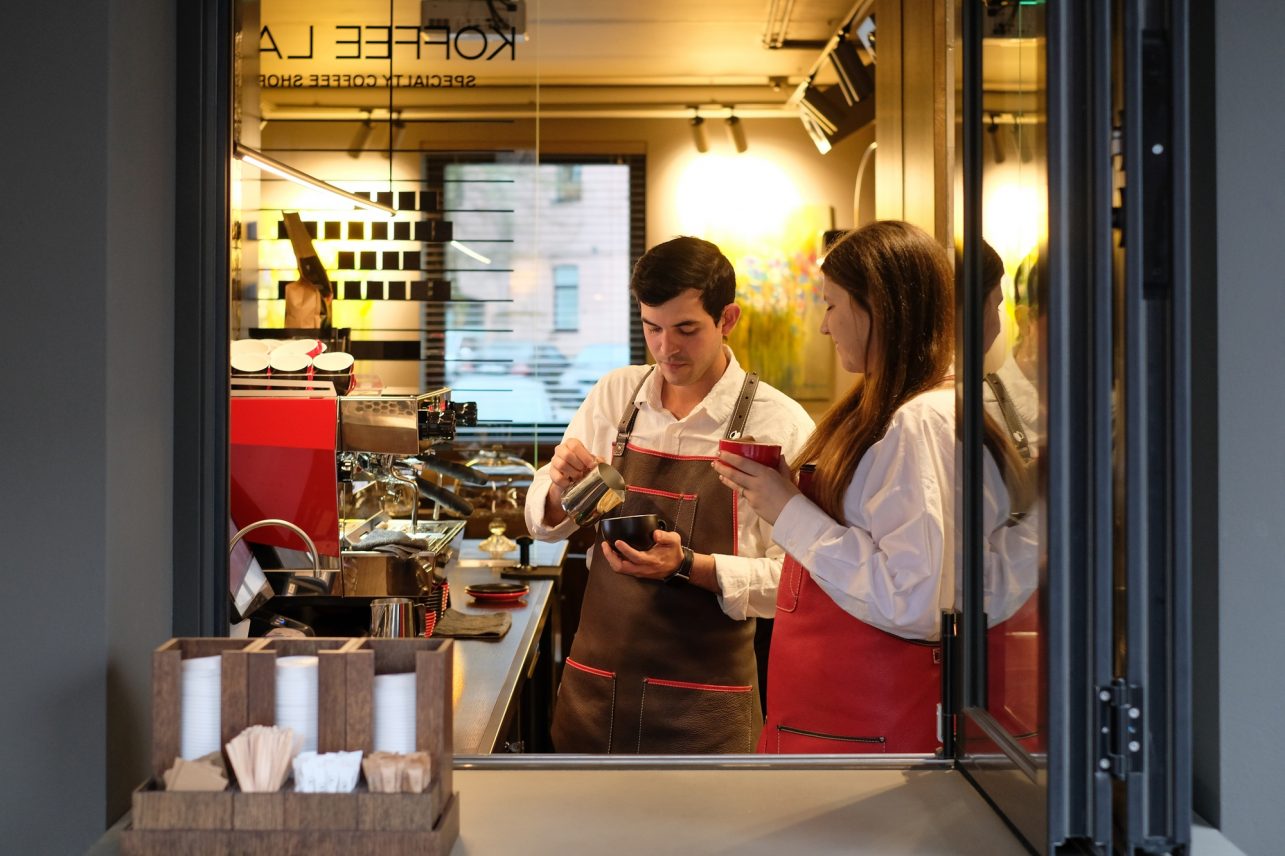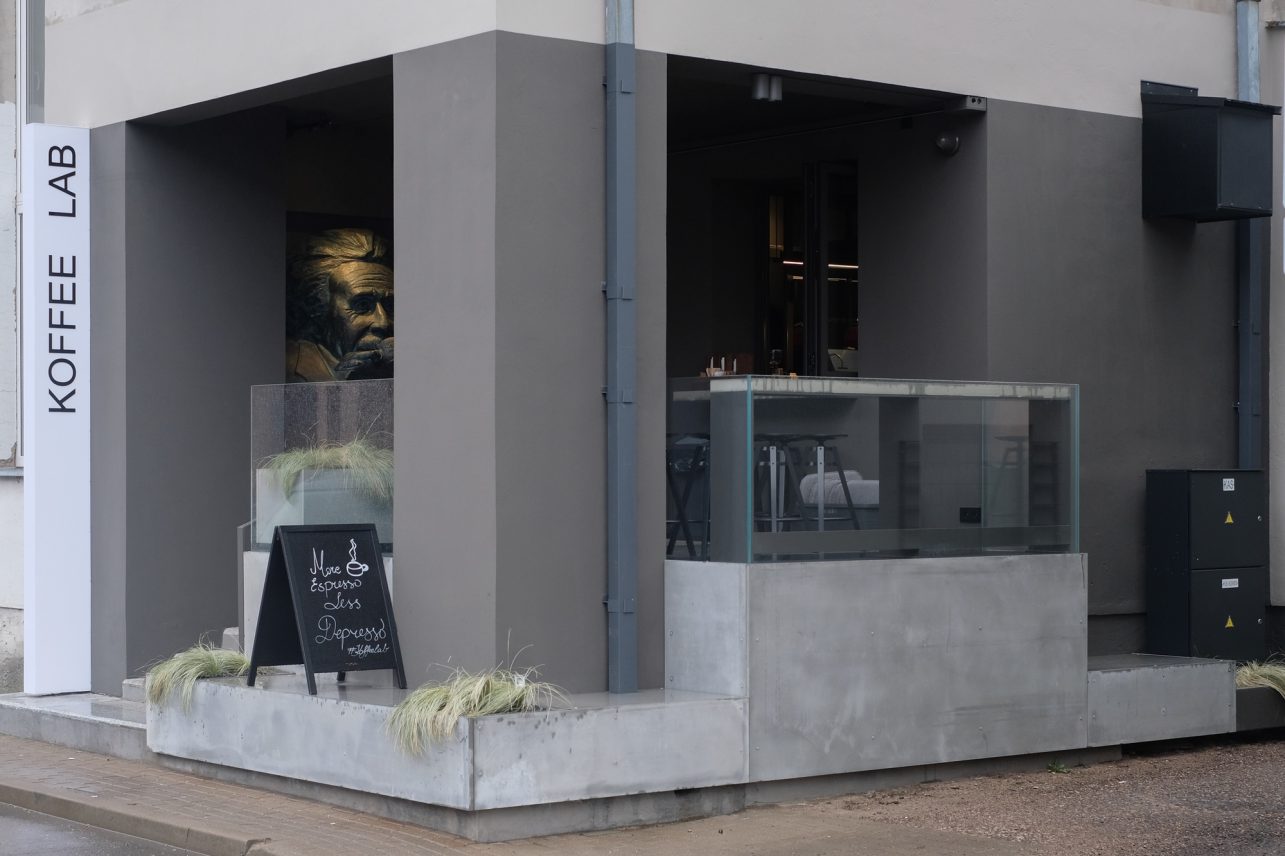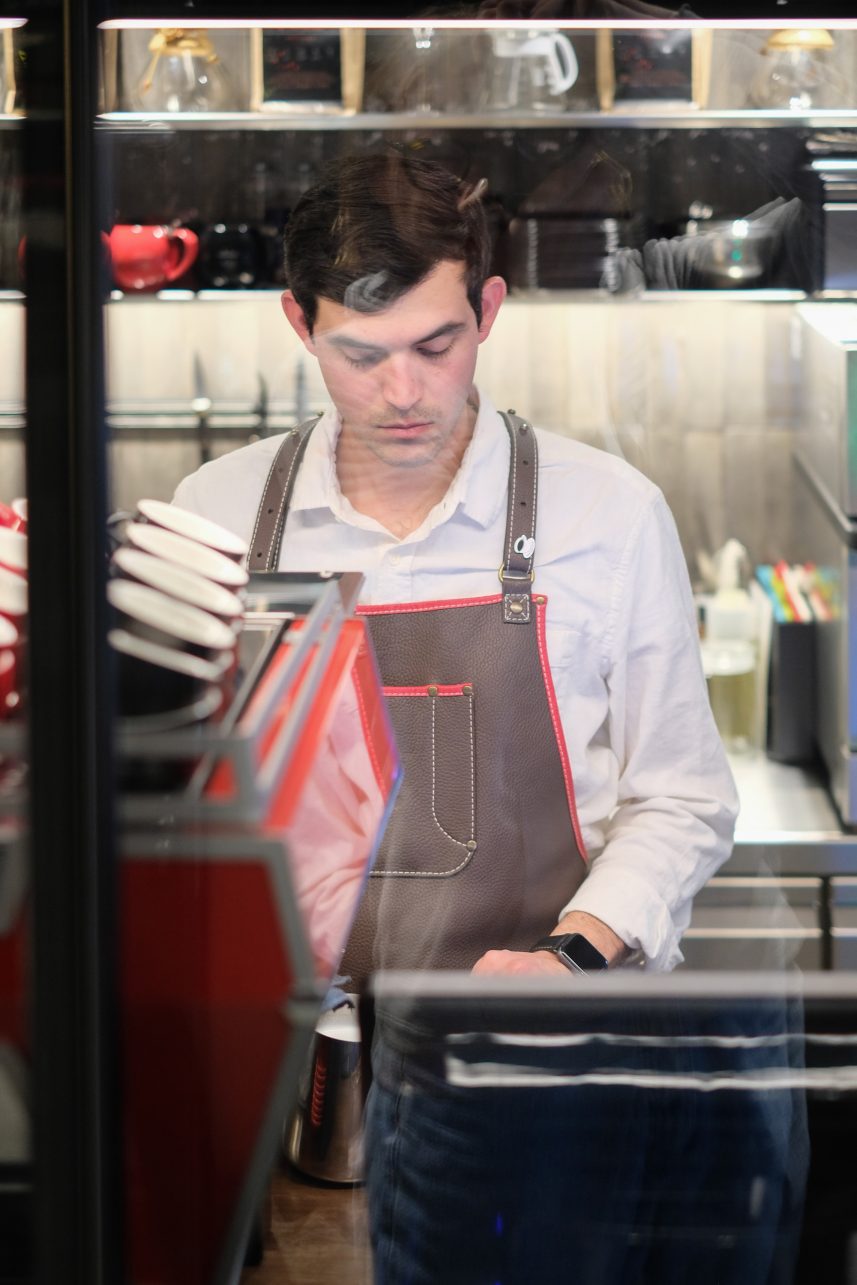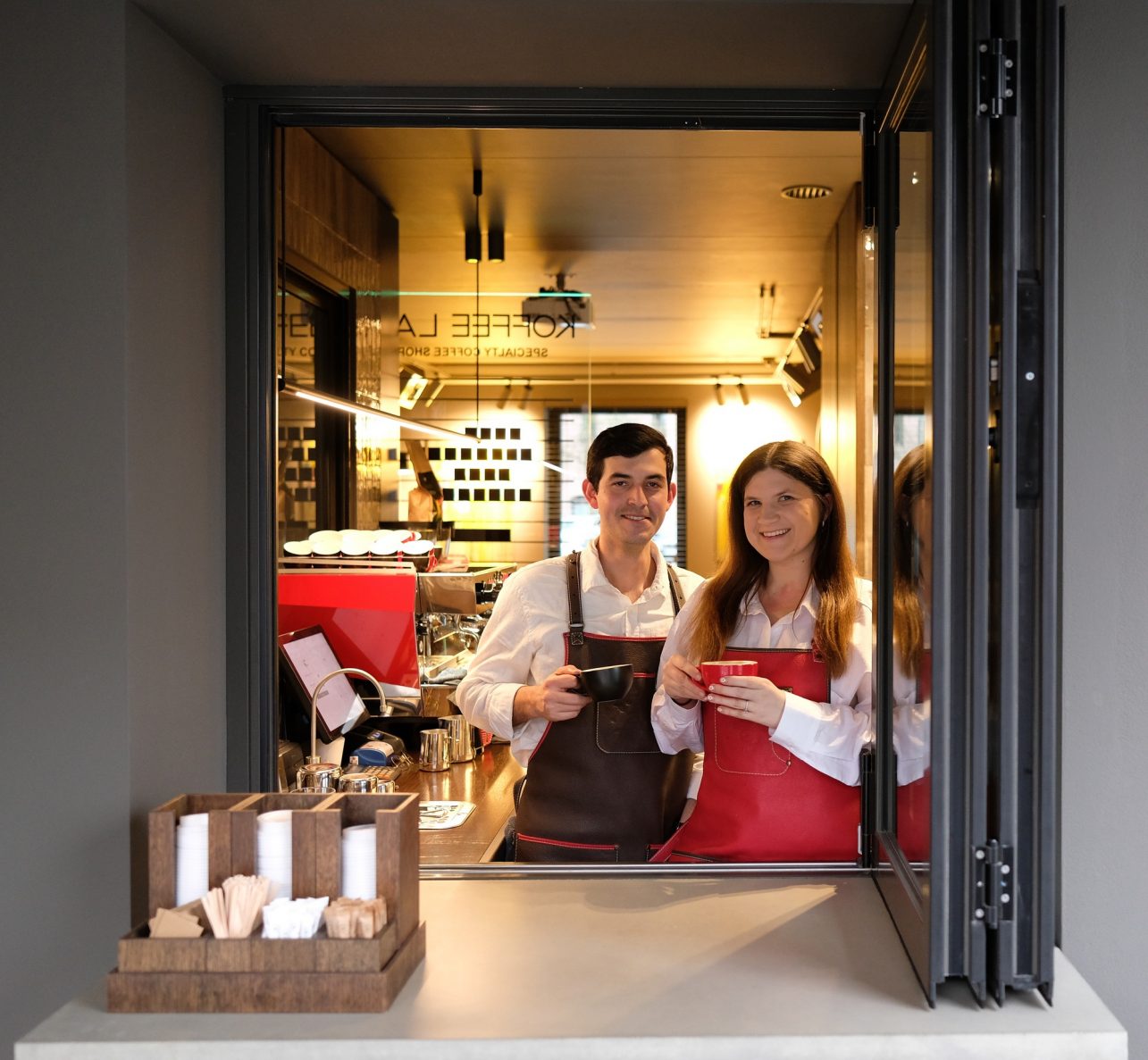Just like me, Kristina Lažauninkaitė and Luis Marrufo Gonzalez live in Kačerginė. We share the same week of stairwell cleaning duty; they patiently endure my cat’s screams in the balcony, and they lent me their V60 and Chemex coffee brewing devices when I wanted to try them out and told me about their similarities and differences. I knew that they wanted to open a cafe in Kaunas almost since the beginning of our acquaintance. And now we meet in their cafe called Koffee Lab located in the Old Town of Kaunas, at the beginning of Jonavos Street, to talk about coffee that connects people and the neighborhood, which is different and yet similar in various countries that they had lived in.

My first question will be very straightforward and short. Why coffee? Why did you choose coffee out of everything the world of flavors has to offer?
Luis: At first, when I moved to Europe, I wasn’t a coffee fan at all. It all started maybe three years ago when I got a job in a hotel while living in Barcelona. Then, I got acquainted with the specifics of coffee, single origin coffee and all the subtleties of it. You could say that it was then that I started my journey as a coffee professional. But it was Kristina, who introduced me to coffee drinking as an everyday ritual.
Kristina: In fact, when we met in Canada twelve years ago, we used to meet for coffee in one coffeehouse chain. We got to know each other better during these meetings. But the idea to open our own coffeehouse was born when we were living in Barcelona.
Luis: I’m from a very warm Mexican region, so it wasn’t a habit to drink coffee every day. It was only during those encounters with Kristina that my love for coffee and seeing it as an everyday ritual was born.
You keep mentioning single origin coffee. Can you explain what it means?
Luis: there is an association called Specialty Coffee Association. Its task is to regulate the quality of coffee. The coffee must not be mass produced, have a clear place of origin, and even a certain rating scale. This coffee is usually collected by hand, not by machine, and often comes from family businesses, small farms. And, of course, the taste, the quality of the beans and their roasting are important for this coffee. Of course, it all raises the price a bit, because, like I said, it doesn’t come from large businesses.
Kristina: I like the fact that by buying this coffee you are supporting a small family business, a tiny farm, where people collect everything by hand. These people select each coffee bean, separating good from bad.
Well, OK, we can enjoy single origin coffee and be interested in it, but it is not necessary to open a coffeehouse. Why did you decide to dive into this business? I understand you have been dreaming about it since Barcelona.
Kristina: Coffee is not just a business for me. Coffee, for me, is a relationship. My grandfather is no longer with us, but I had a coffee drinking ritual with him – we drank coffee every time we met. Friendships and connections are established through coffee. So, I came back from Barcelona with the dream of creating something in my city, regaining the connections I once lost, and finally connecting people. After all, coffee connects people.
Has coffee already managed to connect you with those around you? Who are your coffeehouse’s neighbours and what is your relationship with them?
Luis: We’ve already met the owners of the chocolate shop. It’s also a business of an “international” couple. We are also good friends with the owner of a nail salon. She comes to us every morning to buy coffee. Residents of this house, where the cafe is located, come to have coffee. The doors to the staircase and the cafe are next to each other. The first customers of Koffee Lab were the neighbours.
Kristina: Yes, that’s why we see them every day, we greet each other, we ask how they are doing.

Expanding on the topic of neighbours, it would be interesting to hear both of your neighbourhood experiences. You spent your childhood in different countries, travelled a lot, lived in different places. Kristina, you are from Kačerginė, a small town in Kaunas district. What is it like and what was your neighbourhood like, when you were a kid?
Kristina: Oh, things have changed a lot and I think for the better. Now there are just more people around who can help in an event of a disaster. There used to be almost nothing around my parents’ house back in the day. Having neighbours who were not very communicative, we were practically on our own. As a kid, it was really tough for me because I simply had no friends. I was an only girl there, and the neighbouring houses were inhabited by boys. It also seems that community life is much more active now. In the past, everyone lived their secluded lives in their own bubbles.
Luis: I first came to Kačerginė 12 years ago, so I see a change too. There was nothing there before. Only the forest and Kristina’s parents’ house. Now everything looks much more sociable.
And how was your neighborhood in Mexico? It seems that you should feel a big difference between the neighboring life in your own country and Lithuania, where everything happens, more or less, behind closed doors or gates. Although, as we have said, there has been some sort of breakthrough in communality, we are a bit more restrained as a nation.
Luis: I would say things are more or less similar.
Kristina: But you are all like, “Hey there!” and so on.
Luis: Well, yes, but these are cultural things. From my experience, I don’t remember any stronger ties with our neighbours in Mexico. Maybe because we are very close with my family and relatives. Maybe because I never lived in an apartment building, always in a house. In Mexico, everything was fenced. Not with a fence, but a wall almost as tall as the house, so you were separated from the others by four walls. Don’t get me wrong, it wasn’t dangerous where I lived, it was more about privacy. I think the connections of those living in apartment buildings are stronger and more neighbourly. I only understood what neighbourhood was in Canada, where I went to study. Then I had to share with others not only the same floor or corridor, but also the room. Nevertheless, I think I am a good neighbour. I always follow common rules.
Kristina: I always tell him that neighbours are very important, we all have to be close to each other because if something happens, the neighbour might be and often is the first person you turn to.
Luis: I think the most important thing in a community is mutual respect. When living in a block apartment you must understand that your freedom cannot restrict the freedom of another.

You have had to live in more than one country – you talked about Canada and Spain. Perhaps you can share what features of the neighbourhood you have noticed in these seemingly very different countries?
Kristina: Oh, we lived in a really interesting neighbourhood in Spain! Muy loco! It all depends on the context and people as well as their understanding of culture and the world in general. It was very difficult for me in Spain. We had a neighbour who openly didn’t like us and kept falsely accusing us of things we didn’t do.
Luis: She really wanted to dispose of us!
Kristina: Maybe because she had her own home and we just rented an apartment in that house, she thought she could do whatever she wanted. She would scream at us from the balcony!
Luis: But maybe this was due to the environment, the district?
Kristina: Well, yes, we lived in a bad but very interesting area of Barcelona called Raval. They say that in terms of crime rates it was not the best choice, but it was very interesting to live there.
Luis: Things weren’t only bad though. It is an emigrant district full of hard-working people. Many of them are really nice to each other.

And after all, your dream of a café has matured in Barcelona. So, if we returned to the beginning of the conversation, I would like to know about the general context of coffee and coffeehouses in Kaunas. If coffee unites then what is your relationship with the owners of other coffeehouses?
Kristina: We’re really trying to get to know the owners of other coffeehouses. We know each other pretty well in the coffee community. I think it is very important to support each other. I like to visit several cafes in Kaunas, and I always praise them. I even recommend them to others. We don’t see them as competitors. We are a large but also a small community. Especially here, in Kaunas. Like I said, coffee connects.
I have noticed that it is not only coffee that you buy from small farms. A small bakery bakes the pies and cakes you offer to your customers.
Kristina: We want to share with others the things that we like as well; we are quite picky.
Luis: In fact, it was pretty hard to find a bakery that would fit our standards. After all, you don’t want to serve a simple pastry from a bakery chain next to the single origin coffee, therefore we tried to find a baker who bakes daily, small quantities, can always supply fresh bread and so on.
Kristina: It is very important for us to try everything ourselves at first. Both coffee and pastries, so we can be sure of what we serve.
It’s important that people don’t drink coffee in a rush. You can’t have a quick gulp and continue with your business.
And how do you suggest drinking coffee to better understand its taste?
Kristina: If you understand the quality and taste of coffee, it would be espresso. But, of course, we’re all different, so it’s wrong to say, “Drink this or that.” But we always recommend drinking coffee without sugar!
Luis: I always recommend drinking americano. That would be my choice. If people like milk in coffee, then flat white. Anyway, you should not be afraid to try different types of coffee. African coffee, for example, is fruity and more acidic, which is why people are somehow afraid to drink it. In the past, everyone drank very strong, heavily roasted coffee, trying to mask its bitterness with sugar. In this case you are drinking sugar with a bit of coffee.
Kristina: That’s why we want to bring coffee culture to the people of Kaunas and educate them more about coffee, to show that coffee is not sugar, a lot of milk and syrup. These things simply destroy good coffee.
Luis: I like to compare coffee to white wine. There are people who put ice cubes in white wine. When the ice begins to melt, the wine is diluted with water, and you are no longer satisfied with the original taste, aroma and colour. Same goes for coffee.
Kristina: It’s important that people don’t drink coffee in a rush. You can’t have a quick gulp and continue with your business. I am sure that the culture of enjoying coffee and trying to understand it is gradually becoming more popular.
Luis: And we want to be a part of it.

